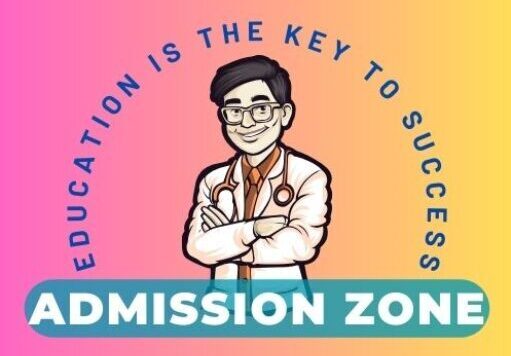Getting an MBBS admission in India is a dream of many medical students and a great opportunity for anyone who wants to become a doctor in future but the process of getting a MBBS degree is competitive, with the NEET (National Eligibility cum Entrance Test) being the main exam that determines admission to both government and private medical colleges across the country.
India has a strong healthcare system and offers excellent medical education, making it a popular choice for students among India as well as abroad. However, getting a seat requires good academic performance and a clear understanding of the eligibility requirements, exam preparation, and the counseling process. Whether you’re from India or another country, knowing the steps for medical admission in India can help you take the right path toward a successful medical career and in this article, we are discussing these in detail.
Duration of MBBS Course in India
The duration of the MBBS course in India is 5.5 years, which includes 4.5 years of academic study and a 1-year compulsory internship. During the academic years, students focus on subjects such as anatomy, physiology, pharmacology, and clinical skills, while the internship provides them experience in hospitals and the healthcare sector.
Why Pursue MBBS in India?
Pursuing an MBBS degree in India is an excellent choice for factors like the medical education system of India, tuition fees, and globally recognized institutions. India has plenty of top government and private medical colleges that offer high-quality education with experienced faculty and infrastructure. The NEET exam simplifies the admission process, while the broad healthcare system provides students options to different medical conditions and treatment practices. An MBBS from India also opens up opportunities both domestically and internationally.
Eligibility Criteria for MBBS Admission
To be eligible for MBBS admission in India candidates must be at least 17 years old by December 31st of the admission year and have completed 12th grade with Physics, Chemistry, Biology, and English as core subjects. Candidates must also secure a minimum of 50% marks in Physics, Chemistry, and Biology (40% for SC/ST/OBC candidates). In addition to meeting these educational requirements, candidates must qualify for the NEET (National Eligibility cum Entrance Test) with minimum qualifying marks, which is compulsory for admission to all medical colleges in India.
MBBS Admission Process in India
The MBBS admission in India begins with candidates meeting eligibility criteria, including a qualifying NEET score and completing 12th grade with Physics, Chemistry, and Biology. After qualifying for NEET, candidates participate in counselling conducted by bodies like Karnataka CET or the All India Quota for seat allocation. Seats are assigned based on NEET rank, category and preferences, followed by document verification. Once a seat is confirmed, candidates must pay the admission fee to confirm their seat in the respective college.
Documents Required for MBBS Admission
For MBBS admission in India, candidates need to provide these essential documents like the NEET scorecard, 10th and 12th grade mark sheets, and a transfer certificate from the last attended institution. Proof of age (birth certificate or 10th class mark sheet) is required, along with a caste certificate for candidates applying under SC/ST/OBC categories. Additionally, a domicile certificate for state quota seats, and recent passport-size photographs are mandatory. Candidates must also submit a government-issued ID proof (like Aadhaar for passport) and a medical fitness certificate from a licensed practitioner confirming their eligibility for the program. These documents ensure a smooth admission process to medical colleges in India.
MBBS Colleges in India
Top Government Medical Colleges in India
India’s government medical colleges are renowned for their quality education and training. Top institutions like AIIMS New Delhi, CMC Vellore, and Maulana Azad Medical College offer excellent academic programs and extensive clinical training. These colleges provide students with field experience in prestigious hospitals, ensuring comprehensive exposure to medical practices.
| S.No | College Name | Established Year | Seat Intake |
|---|---|---|---|
| 1 | AIIMS, New Delhi | 1956 | 100 |
| 2 | CMC, Vellore | 1900 | 150 |
| 3 | Maulana Azad Medical College, New Delhi | 1959 | 250 |
| 4 | Grant Medical College, Mumbai | 1845 | 200 |
| 5 | KGMU, Lucknow | 1911 | 250 |
| 6 | JIPMER, Puducherry | 1823 | 150 |
Top Private Medical Colleges in India
Private medical colleges in India, such as St. John’s Medical College, MS Ramaiah Medical College, and Manipal College of Medical Sciences, are known for their infrastructure and strong academic programs. While tuition fees are higher compared to government colleges, these institutions offer best facilities, research opportunities, and excellent clinical exposure.
| S.No | College Name | Established Year | Seat Intake |
|---|---|---|---|
| 1 | St. John’s Medical College, Bangalore | 1963 | 150 |
| 2 | MS Ramaiah Medical College, Bangalore | 1979 | 150 |
| 3 | Manipal College of Medical Sciences, Manipal | 1953 | 250 |
| 4 | Kasturba Medical College, Mangalore | 1955 | 150 |
| 5 | Shri Ramachandra Medical College, Chennai | 1985 | 200 |
| 6 | BGS Global Institute of Medical Sciences, Bangalore | 2013 | 150 |
Top Deemed Medical Colleges in India
Deemed medical colleges like Sri Ramachandra Medical College, Manipal University, and Kasturba Medical College offer quality education and clinical training. These colleges provide advanced teaching methods, modern infrastructure, and well-established hospital affiliations for practical training.
| S.No | College Name | Established Year | Seat Intake |
|---|---|---|---|
| 1 | Sri Ramachandra Medical College, Chennai | 1985 | 150 |
| 2 | Manipal University, Manipal | 1953 | 250 |
| 3 | Kasturba Medical College, Mangalore | 1955 | 150 |
| 4 | Shri Sathya Sai Medical College, Chennai | 2008 | 150 |
| 5 | Bharati Vidyapeeth Medical College, Pune | 1989 | 200 |
| 6 | Dr. D.Y. Patil Medical College, Pune | 1989 | 250 |
| 7 | Amrita Institute of Medical Sciences, Kochi | 2002 | 150 |
MBBS Fees Structure in India
The MBBS fees structure in India depends on whether the college is government or private and the type of seat (government, management, or NRI quota). In government medical colleges, the fees are relatively affordable, ranging from ₹20,000 to ₹2,00,000 per year for government quota seats. However, for NRI quota seats, the fees can go up to ₹10-20 lakhs per year. On the other hand, private medical colleges have significantly higher fees, typically ranging from ₹10 lakh to ₹50 lakh per year for general seats. For management or NRI seats, the fees may reach ₹30 lakh to ₹60 lakh annually. Additionally, students need to consider extra costs such as hostel fees, study materials, and other essentials, which can add another ₹1-3 lakh per year. The exact fee structure depends on colleges, and it is important for students to verify the fees before taking admission in any college.
Tips for MBBS Admission in India
To get MBBS admission in India, start by preparing for NEET, focusing on Physics, Chemistry, and Biology. Stay updated on admission guidelines and application deadlines for various colleges. Research top government, private, and deemed colleges to understand their eligibility criteria and cut-offs. Practice time management, take mock tests, and prioritize health to manage stress. Apply to multiple colleges to increase your chances. With dedication and strategic planning, you can successfully get admission to medical colleges in india.
Frequently Asked Questions (FAQs)
To be eligible for MBBS admission in India, candidates must have completed 12th grade with Physics, Chemistry, and Biology, and must qualify the NEET exam. Additionally, candidates must be at least 17 years old by December 31 of the admission year.
The admission process for MBBS in India begins with qualifying for the NEET exam, followed by counselling conducted. Seats are allocated based on NEET ranks, category, and preferences.
MBBS fees in India vary widely depending on the college type. Government colleges typically charge between ₹30,000 to ₹3 lakh per year, while private and deemed universities charge anywhere from ₹30 lakh to ₹50 lakh annually.
The primary entrance exam for MBBS admissions in India is NEET (National Eligibility cum Entrance Test). Some private or deemed universities may conduct their own entrance exams.
Yes, foreign students can apply for MBBS in India, provided they meet the eligibility criteria, including a valid NEET score and necessary documents.
If you do not qualify for NEET, you are not eligible for MBBS admission in India, as NEET is mandatory for all medical colleges.
Why Choose Admission Zone
Admission Zone has a proven track record of successfully guiding students for medical admission in India with numerous success stories from reputable medical institutions. Our student-centric approach ensures that we prioritize each student’s needs and aspirations, offering personalized solutions. With an extensive network of top educational institutions across the state, Admission Zone connects students to the best opportunities, helping them easily achieve their medical career goals.
Connect with Us
Start your medical educational journey with the Admission Zone! Contact us today on 7599994403 or WhatsApp us to explore a world of educational possibilities in the state and secure your admission to a brighter future. Our expertise for MBBS admission in India ensures a smooth transition into the realm of medical education.

Conclusion
The NEET exam is a key step in the MBBS admission in India process, as it determines eligibility for both government and private medical colleges. India has some of the best medical institutions, offering excellent infrastructure, experienced faculty, and practical training in various clinical settings. It’s crucial for students to understand the eligibility criteria, required documents, and fee structures of different colleges before applying. With the right preparation for NEET and a clear understanding of the MBBS admission process, students from both India and abroad can successfully pursue their dream of becoming doctors in India.


